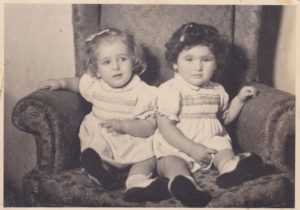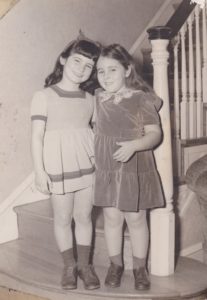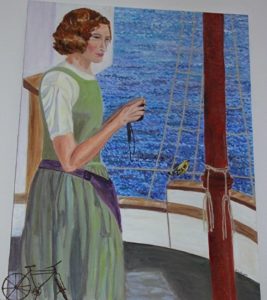


Best Friends
In elementary school we sang a round with lyrics that told us to,
Make new friends but don’t forget the old,
One is silver and the other is gold.
Those words still lurk in the back of my mind and I think about them often. Who are my friends ? Am I as close to my new friends as I was to to the old?
Elaine was my best childhood friend. We were raised together. We were only two weeks apart in age, I being the older. Our mothers were sisters and we lived four streets apart, went to the same schools, and visited Grandma every weekend. I used to taunt her by saying, “You have to listen to me. I’m older than you.” Her quick response was, “ Yea, but you’re going to die first!” That usually put an end to the argument. Now Elaine lives on the opposite coast and it is an effort to stay connected. Occasional phone calls and vacations are not quite the same as being neighbors.
In sixth grade, a cute boy stood attentively by my side when I was on duty as a school crossing guard. I was flattered as we chatted nonstop. Eventually I agreed to participate in a mock wedding and invited our friends to celebrate with us. Once the ceremony was over, we sat on the floor and played spin the bottle though he was more interested in having the bottle point to another girl than me. A crushing moment! Fifty years later the boy, turned professor, got in touch with me. We resumed our communication through email. He had had an interesting academic career and also became an accomplished photographer. We easily shared secrets. But, life moves on, and eventually we lost touch once more. I think of him fondly as a intellectual friend, though not one I would call in an emergency.
When dating, I lived during the era when those of the opposite sex were met through mutual friends. We went to parties, attended school events, and participated in dances put on by religious organizations. In sixth and seventh grade we donned white gloves and attended Saturday dance classes where we were groomed for participation in adult social activities.
Eventually, I met my husband and he soon became my very best friend. But after 25 years we divorced and I lost him as a friend. The shared memories and friendships we had developed as a couple were never spoken of again. I began a new chapter, moved away and developed new friendships.
My first husband and I have since reestablished communication and I find it a pleasure to be in contact with someone who knew my family when I was fourteen. Remembrances pepper life with richness and provide dimensionality. As long as we do not get stuck in the past, there is much to be learned from remembering it.
When my children were young, we partied with couples who had children the same age as ours. I attended a women’s group each month where we sat in a circle sharing inner most thoughts about the month’s topic. There were weekend dinners at each other’s homes and our children visited on playdates. We worked side by side on school committees, baked cookies, participated in auctions, and drove our cars on school outings. It was lots of fun, but today, I am not in touch with even one of these women. What happened to my old friends? Did their lives turn out as they had hoped?
Then Internet came along, and with it Facebook, Instagram, Snapchat, and Twitter. Cell phones arrived along with the ability to text. Instead of attending parties when I wanted to meet a new man I went to match.com and eHarmony. Boy did I have fun for a year meeting fascinating people! I even met a man who asked me to help him license an arithmetic toy he developed. We became business friends and I made it happen. The two of us have not communicated since.
Have these technologies really changed the nature of friendships? I have hundreds of so called friends following my blogs on various sites. Do social media sites develop and keep friendships ? Perhaps the younger generation is more in tuned with this type of friend making.
According to a 2015 Pew Research report, 76% of all teens use social media.They claim it connects them to their friends’ feelings and lives, though they think that they often over do it too and share too much information. 68% report that they have received support from friends during tough times. That sounds wonderful to me though I also understand that there is a class bias. The statistic is more aligned with those living in families earning less than $50,000 than those from more affluent households.
On the flip side, social media can hurt, especially when a girl (boys are more thick skinned) discovers that they had not been invited to an event or activity that had occurred. They are devastated when reading a derogatory remark that has been written about them. Half of those surveyed have had someone post a comment about them that they cannot change or control. Again, this is more prevalent in educated, higher income households which also carries with it a higher amount of what they call drama (conflict, bullying). Unfortunately, the carry over to school can be devastating where fights may occur because of something written online. When friendships end, teens unfriend, block or delete the person. In general, they think that people online are less authentic, less real. The more educated ones spend a lot of time making sure they look good and that they take the time to post only positive content. Teens want to be judged as smart, thoughtful, fun loving hipsters.
Are teen friends true friends? One of my old acquaintances used to say, “it takes 20 years to make a friend.” Aristotle said, “ a friend is a single soul dwelling in two bodies.” A researcher in Birkbeck College in London claims that most of us lose friends as our lives become more technologically connected. The joys of human contact are replaced by electronic stimuli and shallow friendships. Social connections rather than true Aristotelian friendships are the new norm. ‘
According to the American Sociological Review, most people only have two close friends and 25% of Americans have none. Facebook is not usually a place to develop close friendships. Internet contact does not compare with the quality of relationships that are built are face-to face.’
Friendships take time and effort. Relationships deepen when you are willing to be authentic, share intimate feelings, and sensitive vulnerabilities.
Over the course of my career, managing science museums and a catalog company, I met staff, board members and community activists I considered to be my friends. It was a shock to discover that each time I stepped away from my position I was asked to not communicate with those who remained working for the organization. CEOs of businesses are expected to sever ties when they leave, allowing the new president to develop his or her own loyalties. I know of a minister who left her church and had to sign a document saying that she would not attend services or have contact with congregants for two years.
The experience was isolating when that happened to me in Portland. While running OMSI, I was surrounded by people who befriended me because they wanted to be part of an inner elite circle. The day after resigning from the museum, their attention rightly turned to the new director and I was forgotten. That did not bother me too much at first because I had a new business to attend to that took all my time. However, when my catalog company sold after eighteen years of operation, I was confronted by the fact that I had lost so many friends. Surprisingly it was a for-profit business and still the new owner did not want me to have contact with staff for fear they would want to keep old ways of doing things.
Since leaving, I have developed new, wonderful relationships and plan to keep them close to me. And, though I happily have new friendships, I will never forget the old.
Artwork is always for sale. Picture of Elaine is acrylic on canvas, 48″ by 36″ $699.
Contact Marilynne@eichingerfineart.com
